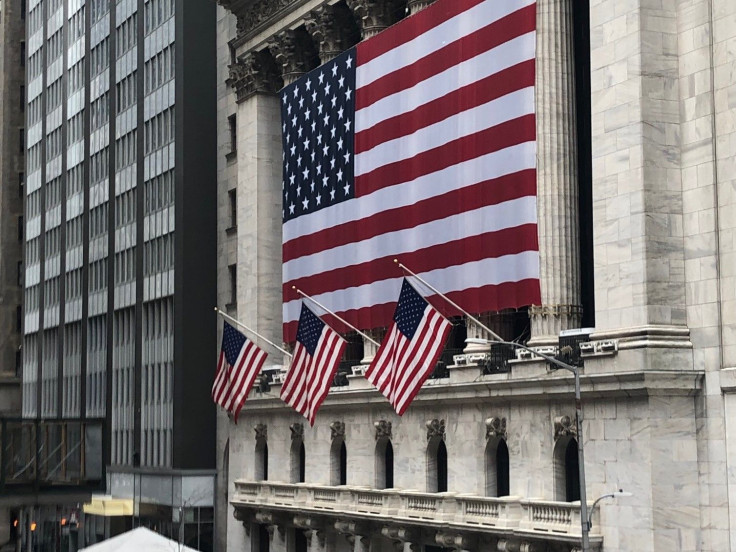Monday’s Stock Market Open: US Equities Struggle For Direction As Covid-19 Cases Spike

KEY POINTS
- Newly cases of coronavirus have spiked in Nevada, Alabama, Florida, California and Arizona
- Covid-19 cases have also surged in Brazil, South Korea and Germany
- Chicago Fed Activity Index jumped to 2.61 in May from minus-17.89 in April.
Update: 12:05 p.m. EDT:
U.S. stocks turned moderately higher in noon trading.
The Dow Jones Industrial Average gained 45.59 points to 25,917.05, while the S&P 500 rose 6.75 points to 3,104.49 and the Nasdaq Composite Index climbed 57.65 points to 10,03.78.
In Europe markets finished lower, as Britain’s FTSE-100 fell 0.76%, while France’s CAC-40 dropped 0.62% and Germany’s DAX slipped 0.55%.
Sales of existing homes dropped 9.7% in May to a seasonally adjusted annualized rate of 3.91 million units, said the National Association of Realtors. Sales plunged 26.6% on an annual basis.
But realtors contend this marked a bottom.
“Well into the month of June, I think people are much more relaxed, knowing that there is a massive stimulus package in the economy,” said Lawrence Yun, chief economist for the Realtors. “I am very confident that this will be the cyclical low point. Buyers are coming back and listings are coming back.”
Original story:
U.S. stocks opened mixed on Monday amid reports that some states and foreign countries recorded a surge of new coronavirus cases.
The Dow Jones Industrial Average dropped 77.19 points to 25,794.27, while the S&P 500 fell 6.24 points to 3,091.50 and the Nasdaq Composite Index edged up 1.81 points to 9,947.94.
Newly confirmed cases of coronavirus have recently spiked in Nevada, Alabama, Florida, California and Arizona.
“The areas of concern that weighed on stocks Friday afternoon were reinforced over the weekend,” wrote Adam Crisafulli of Vital Knowledge. “Governments look set to proceed with reopening, but the real driver of growth will be behavioral normalization and that is very likely to be impended by the steady negative coronavirus news flow.”
Covid-19 cases have also surged in Brazil, South Korea and Germany.
“There’s a war going on between the bulls and bears, with each seizing every little data point to buttress their opposing arguments,” said Vito Racanelli, market intelligence analyst at Fundstrat Global Advisors. “I do think that perhaps the market has gone past its recovery ‘straight-up’ phase, as investors realized coronavirus was not a world ender. But the data remains mixed and Covid-19 fear remains strong, and it’s understandable.”
However, in the U.K., Prime Minister Boris Johnson will soon ease social distancing rules to boost the hospitality industry.
“The market doesn’t believe that we will see such draconian lockdowns even if there is a resurgence of the virus. The politics have moved on,” said James Athey, a money manager at Aberdeen Standard Investments. “Rightly or wrongly, there’s also a pretty widespread feeling that riskier assets won’t go down too far because the Federal Reserve won’t let them.”
The Federal Reserve Bank of Chicago's National Activity Index jumped to 2.61 in May from minus-17.89 in April.
“Could a rise in new infections force advanced economies to re-impose lockdowns that are so harsh and widespread that they would shatter confidence and disrupt the nascent economic rebound? Four months after the virus started to hit Europe badly, that remains the key risk to watch for the economic outlook as well as for financial markets,” said Holger Schmieding, chief economist at Berenberg Bank of Hamburg.
Overnight in Asia, markets finished lower. The Shanghai Composite edged down 0.08%; Hong Kong’s Hang Seng fell 0.54%; while Japan’s Nikkei-225 slipped 0.18%.
In Europe markets traded lower, as Britain’s FTSE-100 fell 0.33%, while France’s CAC-40 dropped 0.55% and Germany’s DAX slipped 0.56%.
Crude oil futures slipped 0.18% at $39.68 per barrel, Brent crude edged up 0.12% at $42.24. Gold futures rose 0.99%.
The euro rose 0.44% at $1.1228 while the pound sterling gained 0.4% at $1.2397.
© Copyright IBTimes 2025. All rights reserved.





















